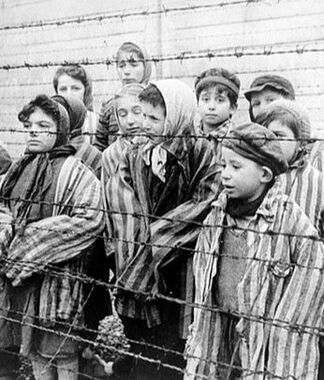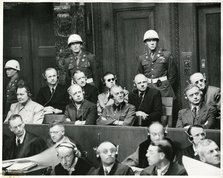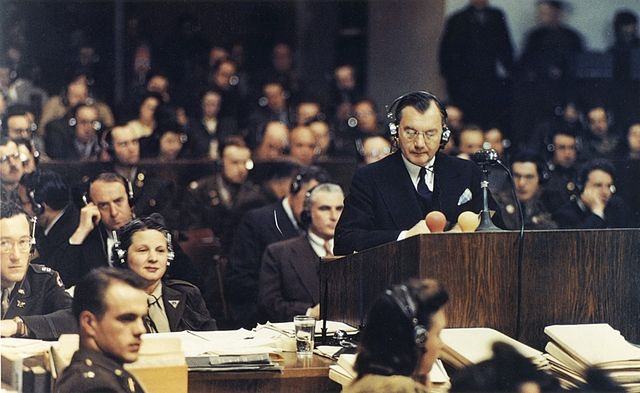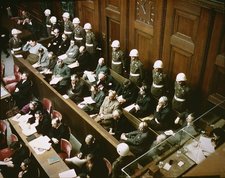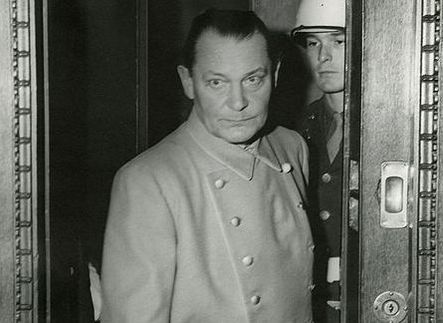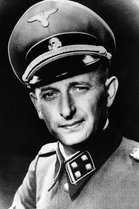NUREMBERG TRIALS IN THE HOLOCAUST
The Holocaust is one of the most important events of the 20th century and occurred alongside the major events of World War II in Europe. The event that is most often associated with the end of both the Holocaust and World War II is the Nuremberg Trials, which saw the Allied nations impose justice on many high ranking Nazi officials for their roles in carrying out both events.
|
The Holocaust is perhaps the most significant genocide in human history and involved the deaths of over 11 million people, including 6 million Jewish people. The brutality of the concentration camps and death camps shocked the Allied leaders and led to calls for justice against the Nazis based on the concepts of ‘war crimes’ and ‘crimes against humanity’. A ‘war crime’ is defined as an act carried out during a war that is beyond what is considered acceptable. For example, while fighting and killing enemy soldiers during battle would be considered normal aspects of war, the extermination of groups of people based upon their ethnicity would not. As such, the events of the Holocaust and the Nazi’s role in carrying them out are referred to as a war crime. A ‘crime against humanity’ is defined as a deliberate act that causes human suffering or death. In short, the horrible conditions and treatment that the Jewish, and others, faced during the Holocaust certainly displayed human suffering and death. Not only did over 11 million die as a result of the actions of the Nazis, but the people also suffered horrible conditions in the ghettos and concentration camps.
|
During World War II, the Allied powers met several times to discuss post-war Europe and how to bring the Nazis to justice. For example, three significant conferences were held including: the Tehran Conference in 1943 and the Yalta Conference and Potsdam Conference in 1945. In general, the leaders initially disagreed on how to carry out justice. Winston Churchill of Britain and Joseph Stalin of the Soviet Union favored summary executions, meaning the officials would be killed without a trial. Whereas, U.S. President Franklin D. Roosevelt, and later Harry S. Truman, were in favor of a formal trial to ensure the collection and presentation of evidence in order to prove guilt. Eventually, the other leaders agreed with the American approach and the nations set out to establish the system of trials.
The trials were established in the German city of Nuremberg for several reasons. First it had the Nuremberg Palace of Justice which was large and could accommodate all of the necessary judges and prisoners. Second, Nuremberg was the spiritual birthplace of the Nazi Party and the site of the creation of the Nuremberg Laws. The Allies considered it fitting that the Nazi Party would see its official end in the same place that it saw its beginning.
At the establishment of the trials, it was decided that France would also play a central role. As such, each of the four Allied countries (United States, Britain, Soviet Union and France) appointed a set of judges and a prosecutor. The Nazis were defended mainly by German lawyers.
The Nuremberg Trials began on November 19th, 1945 with indictments against twenty four captured Nazis and different Nazi organizations, including: Nazi leadership, the SS, the Gestapo, and the SA. The first charge was that the Nazis participated in a conspiracy to wage war and end the peace following World War I. The second charge was that the German leadership planned and carried our wars of aggression. The third charge was for war crimes and the fourth charge was for carrying out crimes against humanity. Of the twenty four Nazis tried at the Nuremberg Trials only five were found not guilty. The other nineteen were convicted and either sentenced to prison terms, including life in prison, or given a death sentence.
In general, the lawyers of the Nazi defendants argued a similar defense. First, they argued that the Nuremberg Trials were not legitimate since the ‘charges’ they were upholding did not exist before the ‘crimes’ were committed. Further, they argued that the court had no authority over the defendants and insisted that the Allies were only seeking to punish the Nazis because they viewed themselves as the victors of the war. Next, the Nazis argued that they were simply following the orders of their commanding officers and should not be held accountable for what was official policy of the country.
|
The most famous and highest ranking, of the Nazis at the Nuremberg Trials was Hermann Goering. Goering was a prominent Nazi leader who was the head of the Luftwaffe, the German Air Force, and was set to replace Hitler as the next in command of Nazi Germany. He was found guilty of all four charges and sentenced to death; however, he committed suicide with a cyanide pill on the night before his execution. Ten other Nazi officials were sentenced to death with all of them being hanged. The trials concluded in September of 1946.
|
At the end of World War II several Nazis committed suicide in order to avoid being captured and facing justice for their war crimes and crimes against humanity. For example, Adolf Hitler committed suicide with his wife, Eva Braun, On April 30th, 1944 as the Soviet Army surrounded Berlin during the final stages of the Battle of Berlin. Other high ranking Nazis also committed suicide, including: Heinrich Himmler and Joseph Goebbels.
|
While others avoided the Nuremberg Trials by fleeing at the end of World War II, many of them were hunted down and captured. For example, Adolf Eichmann, head of the Gestapo department dealing with Jewish affairs fled to Central America. During the war he was responsible for organizing the transportation of the Jewish to the death camps from the ghettos. He was captured in Argentina by Israeli Nazi-hunters and was eventually put on trial in Israel 1961 and executed in 1962. His trial was modeled after the earlier Nuremberg Trials.
Following the main Nuremberg Trial, which ended in 1946, there was a series of twelve more trials that took place between 1946 and 1949. These trials were focused on particular issues, including: Nazi Doctors, Judges, Einsatzgruppen, and more.
|
The Nuremberg Trials were a significant event in the history of World War II and the Holocaust. They were the first such ‘international’ trials and established a model for future trials. For example, in the 1990s, following the genocide in Rwanda, a similar international court was established to try war criminals from that country. As well, the Nuremberg Trials helped establish a renewed interest in human rights issues. For instance, the United Nations was established in 1946 with the goal of preventing similar future conflicts. Furthermore, the United Nations created the Universal Declaration of Human Rights in 1948 with the goal of restoring faith in basic human rights and to avoid future related war crimes, crimes against humanity and genocides.
CITE THIS ARTICLEAUTHOR
|
|

